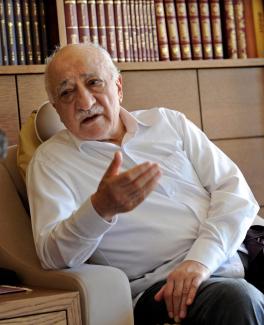Gülen movement
Power struggle in Turkey

Prime Minister Recep Tayyip Erdogan’s "most powerful opponent" (according to the daily paper Frankfurter Allgemeine Zeitung) is 72 years old, in poor health and resident in the USA. From Pennsylvania, he started building a global network of private schools, cultural centres and other educational establishments in 1999. The Gülen movement is regarded as the fastest-growing community of ethnic Turks in the EU. It is controversial at home and abroad. Western governments welcome Gülen’s stance that Islam and democracy are compatible, according to Seufert, but they view his nationalism with scepticism.
The researcher argues that Gülen’s main aim is to create an educated Muslim elite. The imam wants "religiously committed individuals who are also educated in line with modern standards". This goal does not fit well with Gülen’s claim to lead a democratic rather than an Islamic movement. Officially, religious instruction is not on the curriculum of Gülen establishments, as Seufert reports. Like many observers, he struggles to explain this paradox and define the Gülen movement precisely. He considers it "a hierarchically structured religious community with a civil-society mission and a pronounced political drive".
Many of Gülen’s supporters are from rural Anatolia and have advanced economically to form a new middle class. They see their imam as a preserver of religious values and social cohesion in an urbanising society. Many Gülen followers hold jobs in Turkey’s judiciary and government bureaucracy.
In December 2013, public prosecutors and the police launched corruption investigations that plunged the government into crisis. By early January, several ministers had resigned and the prime minister felt compelled to dismiss more ministers in a major cabinet reshuffle. The ruling Justice and Development Party (AKP) claims that the investigation was instigated by Gülen supporters. The preacher refutes the allegation.
The fact is that the AKP – the ruling party in Turkey since 2002 – and the Gülen movement have been engaged in a veritable "feud" (Seufert) for some years even though they share ideological roots and marched side by side for a long time. According to the SWP paper, they both want Turkey to serve as "a counterweight to a western influence, however interpreted".
In the years of military government, Gülen came to terms with the respective regimes, according to Seufert. In the late 1990s, his organisation was targeted by the secular Kemalist elites which ran Turkey for decades. Back then, Gülen was on Erdogan’s side. When Erdogan created the AKP in 2001, the imam’s support was crucial. His supporters had managed to establish networks within the hitherto Kemalist bureaucratic system – especially in the police force and judiciary, but even in the military.
In Seufert’s eyes, the split between the two camps happened for a number of reasons. The Erdogan government accuses the Gülen movement of seeking to evade state control. The special courts’ responsible for state security employ particularly large numbers of Gülen supporters and have been denounced for behaving like a "state within the state". Another issue Seufert mentions is divergent political visions, primarily in regard to the Kurdish question. Erdogan started secret negotiations to make peace with Kurdish organisations.
When, however, Gülen’s supporters adopted a confrontational stance towards the government, it came as a complete surprise, Seufert writes, because "however strongly a social force is anchored in the bureaucratic system, it cannot really pose a threat to the government without military backing". Hence the talk of the Gülen movement’s "political suicide".
Seufert’s concluding thesis has been overtaken by political events. He sees a political opportunity for Gülen’s supporters only if there is a change of leadership within the AKP or if the party becomes divided. In the present crisis, Erdogan’s power certainly looks shaky. How the power struggle ends is anyone’s guess.
Sabine Balk










